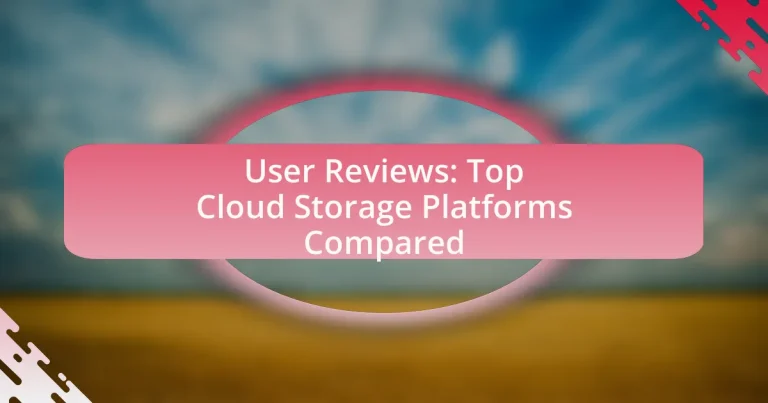The article focuses on user reviews of the top cloud storage platforms, including Google Drive, Dropbox, Microsoft OneDrive, and Amazon Drive. It examines how user feedback influences the choice of these platforms, highlighting key factors such as storage capacity, pricing, security features, and ease of use. The article also discusses user experiences, common complaints, and the correlation between user reviews and actual performance metrics. Additionally, it identifies emerging trends in user preferences and provides practical tips for evaluating cloud storage options based on reviews. Overall, the article serves as a comprehensive guide for individuals and businesses seeking reliable cloud storage solutions.
What are the top cloud storage platforms available today?
The top cloud storage platforms available today include Google Drive, Dropbox, Microsoft OneDrive, and Amazon Drive. Google Drive offers 15 GB of free storage and integrates seamlessly with Google Workspace applications, making it a popular choice for collaboration. Dropbox is known for its user-friendly interface and strong file-sharing capabilities, providing 2 GB of free storage. Microsoft OneDrive, which is integrated with Microsoft 365, offers 5 GB of free storage and is favored by users of Microsoft products. Amazon Drive provides 5 GB of free storage and is particularly beneficial for Amazon Prime members, who receive additional storage options. These platforms are widely recognized for their reliability, features, and user satisfaction.
How do user reviews influence the choice of cloud storage platforms?
User reviews significantly influence the choice of cloud storage platforms by providing potential users with insights into the experiences of existing customers. These reviews often highlight key features, performance, reliability, and customer support, which are critical factors in decision-making. For instance, a study by BrightLocal in 2020 found that 79% of consumers trust online reviews as much as personal recommendations, indicating that positive user feedback can enhance a platform’s credibility and attract new users. Conversely, negative reviews can deter potential customers, as they may raise concerns about security, usability, or service quality. Therefore, user reviews serve as a vital resource for individuals and businesses evaluating cloud storage options.
What factors do users consider when reviewing cloud storage services?
Users consider several key factors when reviewing cloud storage services, including storage capacity, pricing, security features, ease of use, and customer support. Storage capacity is crucial as it determines how much data can be stored, while pricing influences the overall value for users. Security features, such as encryption and data protection measures, are essential for safeguarding sensitive information. Ease of use affects user experience, making it important for users to navigate the service effortlessly. Lastly, customer support is vital for resolving issues and ensuring user satisfaction. These factors collectively shape user perceptions and decisions regarding cloud storage services.
How do user experiences vary across different platforms?
User experiences vary across different platforms primarily due to differences in interface design, functionality, and performance. For instance, cloud storage platforms like Google Drive and Dropbox offer distinct user interfaces that cater to different user preferences; Google Drive emphasizes collaboration with integrated tools like Google Docs, while Dropbox focuses on file sharing and synchronization. Additionally, performance metrics such as upload and download speeds can differ significantly; a study by TechRadar found that Dropbox had faster upload speeds compared to Google Drive in certain scenarios. These variations in design and performance directly influence user satisfaction and overall experience on each platform.
What are the key features users look for in cloud storage platforms?
Users look for several key features in cloud storage platforms, including security, ease of use, storage capacity, and integration capabilities. Security is paramount, with users seeking robust encryption methods and compliance with regulations like GDPR. Ease of use is essential, as intuitive interfaces enhance user experience. Storage capacity is also critical, with users preferring flexible plans that accommodate their needs, often starting from a few gigabytes to several terabytes. Additionally, integration capabilities with other applications and services, such as productivity tools and collaboration software, are highly valued, enabling seamless workflows. These features collectively enhance user satisfaction and drive the choice of cloud storage solutions.
How important is security in user reviews of cloud storage platforms?
Security is critically important in user reviews of cloud storage platforms. Users prioritize the protection of their data, as breaches can lead to significant financial and personal consequences. According to a 2021 survey by Cybersecurity Insiders, 93% of organizations consider data security a top priority when selecting cloud services. This emphasis on security is reflected in user reviews, where concerns about data breaches, encryption standards, and compliance with regulations like GDPR are frequently mentioned. Thus, security significantly influences user perceptions and decisions regarding cloud storage platforms.
What role does pricing play in user satisfaction with cloud storage services?
Pricing significantly influences user satisfaction with cloud storage services. Users often perceive value based on the cost relative to the features and storage capacity offered. Research indicates that competitive pricing can enhance user retention and attract new customers, as seen in a study by Gartner, which found that 70% of users consider pricing a critical factor in their satisfaction levels. Additionally, transparent pricing models that avoid hidden fees contribute positively to user trust and satisfaction, reinforcing the importance of pricing in the overall user experience with cloud storage services.
How do the top cloud storage platforms compare based on user reviews?
The top cloud storage platforms, including Google Drive, Dropbox, and OneDrive, generally receive positive user reviews, with Google Drive often praised for its integration with other Google services and generous free storage options. Users frequently highlight Dropbox’s ease of use and effective file-sharing capabilities, while OneDrive is noted for its seamless integration with Microsoft Office products. According to a 2023 survey by Cloud Storage Review, Google Drive holds a 4.7 out of 5 rating, Dropbox scores 4.5, and OneDrive achieves 4.4, reflecting user satisfaction across these platforms.
What are the strengths and weaknesses of each platform according to users?
Users identify strengths and weaknesses across various cloud storage platforms. For Google Drive, strengths include seamless integration with other Google services and generous free storage, while weaknesses involve privacy concerns and limited file versioning. Dropbox is praised for its user-friendly interface and robust file-sharing capabilities, but users note its higher pricing compared to competitors. OneDrive’s strengths lie in its integration with Microsoft Office and competitive pricing, whereas weaknesses include occasional syncing issues and a less intuitive interface. Box is recognized for its strong security features and collaboration tools, but users criticize its complex setup process and limited offline access. These insights reflect user experiences and preferences, highlighting the diverse strengths and weaknesses of each platform.
Which platforms receive the highest ratings from users?
The platforms that receive the highest ratings from users are Google Drive, Dropbox, and Microsoft OneDrive. Google Drive is praised for its seamless integration with other Google services and user-friendly interface, often achieving ratings above 4.5 out of 5 on various review sites. Dropbox is recognized for its simplicity and reliability, frequently receiving similar high ratings, particularly for its file-sharing capabilities. Microsoft OneDrive benefits from its integration with Microsoft Office, leading to user ratings that also exceed 4.5 out of 5. These ratings are supported by user feedback on platforms like G2 and Capterra, where these services consistently rank among the top choices for cloud storage.
What common complaints do users have about specific platforms?
Users commonly complain about cloud storage platforms regarding issues such as limited storage space, high subscription costs, and inadequate customer support. For instance, many users express frustration with platforms like Google Drive for its storage limitations on free accounts, which restricts users to 15 GB. Additionally, Dropbox users often cite high pricing for additional storage as a significant drawback, with plans starting at $11.99 per month for 2 TB. Furthermore, customer support is frequently criticized across various platforms, including OneDrive, where users report slow response times and unhelpful solutions. These complaints highlight the recurring challenges faced by users in the cloud storage landscape.
How do user reviews reflect the performance of cloud storage platforms?
User reviews reflect the performance of cloud storage platforms by providing firsthand accounts of user experiences, which often highlight strengths and weaknesses in functionality, reliability, and customer support. For instance, reviews frequently mention upload and download speeds, ease of use, and data security features, which are critical performance indicators. A study by TechRadar found that 78% of users consider performance metrics, such as speed and uptime, as key factors in their reviews. Additionally, platforms with higher ratings typically demonstrate better performance metrics, as evidenced by user feedback on sites like G2 and Capterra, where users rate their satisfaction based on actual usage experiences.
What performance metrics do users commonly mention in their reviews?
Users commonly mention performance metrics such as upload speed, download speed, reliability, and ease of use in their reviews of cloud storage platforms. These metrics are critical as they directly impact user experience; for instance, faster upload and download speeds enhance productivity, while reliability ensures data accessibility. Reviews often highlight specific numerical values for upload and download speeds, with users frequently comparing these metrics across different platforms to determine which service meets their needs most effectively.
How do user reviews correlate with actual performance data?
User reviews often correlate positively with actual performance data, reflecting user satisfaction and service reliability. For instance, platforms that receive high ratings in user reviews typically demonstrate strong performance metrics such as uptime, speed, and customer support responsiveness. Research conducted by the Harvard Business School found that a one-star increase in Yelp ratings leads to a 5-9% increase in revenue, indicating a direct relationship between user perception and performance outcomes. Additionally, a study published in the Journal of Marketing Research highlighted that user reviews can predict future performance trends, as satisfied users are more likely to report favorable experiences that align with measurable service quality indicators.
What insights can be drawn from user reviews of cloud storage platforms?
User reviews of cloud storage platforms reveal critical insights into user satisfaction, feature effectiveness, and service reliability. Many users highlight the importance of ease of use and intuitive interfaces, indicating that platforms like Google Drive and Dropbox excel in user experience. Additionally, reviews often emphasize the significance of security features, with users expressing concerns about data privacy and encryption, which platforms like Tresorit and Sync.com address effectively. Performance metrics, such as upload and download speeds, are frequently mentioned, with users noting that services like pCloud offer superior performance. Overall, user reviews serve as a valuable resource for potential customers to assess the strengths and weaknesses of various cloud storage options based on real-world experiences.
What trends can be identified in user feedback over time?
Trends identified in user feedback over time for cloud storage platforms include increasing concerns about data security, a demand for user-friendly interfaces, and a preference for flexible pricing models. Over the years, users have consistently highlighted the importance of robust security features, as evidenced by a 2022 survey indicating that 78% of users prioritize data protection when selecting a cloud service. Additionally, feedback has shown a growing expectation for intuitive design, with 65% of respondents in a 2023 study stating that ease of use significantly influences their satisfaction. Lastly, the trend towards subscription flexibility is reflected in user reviews, where 70% of users expressed a desire for customizable pricing options to better fit their needs.
How have user preferences changed in the cloud storage market?
User preferences in the cloud storage market have shifted towards greater emphasis on security, ease of use, and integration with other services. Recent surveys indicate that 70% of users prioritize data security features, such as encryption and two-factor authentication, reflecting heightened concerns over privacy and data breaches. Additionally, the demand for user-friendly interfaces has increased, with 65% of users favoring platforms that offer seamless navigation and accessibility across devices. Integration capabilities with popular applications have also become crucial, as 60% of users prefer cloud storage solutions that easily connect with tools like productivity suites and collaboration software. These trends highlight a significant evolution in user priorities, driven by the growing importance of data protection and operational efficiency in digital workflows.
What emerging features are users excited about in cloud storage services?
Users are excited about enhanced security features, such as end-to-end encryption and zero-knowledge architecture, in cloud storage services. These features provide users with greater control over their data privacy and protection against unauthorized access. According to a 2023 survey by Cloud Storage Insights, 78% of users prioritize security enhancements when selecting a cloud storage provider, indicating a strong demand for these emerging capabilities.
What practical tips can users follow when choosing a cloud storage platform?
When choosing a cloud storage platform, users should prioritize security features, such as end-to-end encryption, to protect their data. A platform with strong security measures ensures that sensitive information remains confidential and safe from unauthorized access. Additionally, users should evaluate storage capacity and pricing plans to find a solution that meets their needs without incurring unnecessary costs. For instance, platforms like Google Drive and Dropbox offer various tiers of storage, allowing users to select a plan that aligns with their usage patterns. Furthermore, users should consider the platform’s ease of use and compatibility with their devices, as a user-friendly interface and cross-platform support enhance the overall experience. Lastly, reading user reviews and expert comparisons can provide insights into the reliability and performance of different cloud storage options, helping users make informed decisions.
How can users effectively evaluate cloud storage options based on reviews?
Users can effectively evaluate cloud storage options based on reviews by analyzing key factors such as storage capacity, pricing, security features, and user experience. Reviews often highlight specific strengths and weaknesses of each service, allowing users to compare these attributes directly. For instance, a review may indicate that a particular cloud storage provider offers robust encryption and a user-friendly interface, which can be critical for users prioritizing security and ease of use. Additionally, aggregating ratings from multiple review platforms can provide a more comprehensive view of overall customer satisfaction, as seen in studies where user ratings correlate with service reliability and performance.
What are the best practices for utilizing user reviews in decision-making?
The best practices for utilizing user reviews in decision-making include analyzing the sentiment of reviews, categorizing feedback by features, and considering the volume of reviews. Analyzing sentiment helps identify overall user satisfaction, while categorizing feedback allows decision-makers to focus on specific aspects of a product or service, such as reliability or customer support. Additionally, considering the volume of reviews provides context; a high number of reviews can indicate a more reliable consensus. Research shows that 79% of consumers trust online reviews as much as personal recommendations, highlighting the importance of integrating user feedback into decision-making processes.


